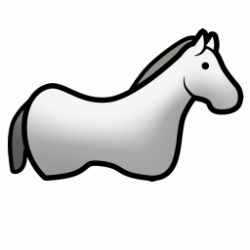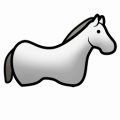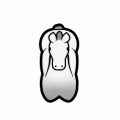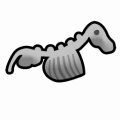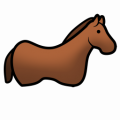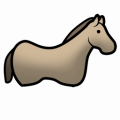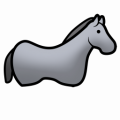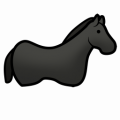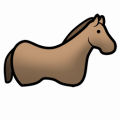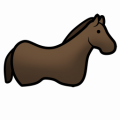Difference between revisions of "Horse"
m (→Analysis) |
m (Fix typo) |
||
| (11 intermediate revisions by 3 users not shown) | |||
| Line 1: | Line 1: | ||
| − | {{ | + | {{Infobox main|animal |
| name = Horse | | name = Horse | ||
| − | | image = Horse.png | + | | image = Horse east.png |
| − | | description = A large hoofed mammal with a short coat, a long mane, and a long tail. Horses have been domesticated since ancient times.<br>When in a caravan, people can ride horses to increase the caravan's speed. | + | | description = A large hoofed mammal with a short coat, a long mane, and a long tail. Horses have been domesticated since ancient times.<br/>When in a caravan, people can ride horses to increase the caravan's speed. |
| − | |||
| type = Animal | | type = Animal | ||
| movespeed = 5.8 | | movespeed = 5.8 | ||
| Line 13: | Line 12: | ||
| ridingspeed = 1.6 | | ridingspeed = 1.6 | ||
| herdanimal = true | | herdanimal = true | ||
| + | | combatPower = 100 | ||
| bodysize = 2.4 | | bodysize = 2.4 | ||
| healthscale = 1.75 | | healthscale = 1.75 | ||
| Line 63: | Line 63: | ||
| livesin_aridshrubland = 0.1 | | livesin_aridshrubland = 0.1 | ||
}} | }} | ||
| − | '''Horses''', called '''Mares''' if female and '''Stallions''' if male, are tameable [[herbivore]]s with a fast movement speed | + | '''Horses''', called '''Mares''' if female and '''Stallions''' if male, are tameable [[herbivore]]s with a fast movement speed. |
| − | Horses can come in a variety of different | + | Horses can come in a variety of different colors: White, Gray, Black, Brown, and Light Brown. |
== Acquisition == | == Acquisition == | ||
Horses can be found in {{Habitats}}. They can either be tamed by a [[Work#Handle|handler]] or self-tame in a random event, and can be bought and sold in other [[Trade#Faction base|faction bases]] and from [[Trade#Bulk goods trader 2|bulk goods traders]]. Horses purchased from traders will be already tamed. | Horses can be found in {{Habitats}}. They can either be tamed by a [[Work#Handle|handler]] or self-tame in a random event, and can be bought and sold in other [[Trade#Faction base|faction bases]] and from [[Trade#Bulk goods trader 2|bulk goods traders]]. Horses purchased from traders will be already tamed. | ||
| − | == | + | == Summary == |
| − | + | {{Pen Animal Note|Horses}} | |
| − | + | Horses are also [[pack animal]]s, and will carry up to {{P|Pack Capacity}} kg of weight in a [[caravan]]. They can additionally be ridden for up to 160% caravan speed, the highest of any animal (tied with the [[thrumbo]]). | |
| − | + | == Analysis == | |
| + | === Pack animal === | ||
| + | Horses are easily the best pack animal in the game. They are tied with [[thrumbo]]s for the highest caravan speed bonus in the game, and thrumbos refuse to carry goods. In addition, horses carry the most weight per unit nutrition. For the fastest riding speed, you should have at least 1 horse for every colonist you send on a caravan. | ||
| − | + | They also make for a great slaughter animal. | |
| + | |||
| + | === Nutrition === | ||
| + | When slaughtered, a horse yields {{#vardefineecho:baby_meat|{{Meat Leather Curve|{{#expr:{{P|Body Size}}*0.2*140}}}}}} meat and {{Meat Leather Curve|{{#expr:{{P|Body Size}}*0.2*40}}}} leather as a baby; {{Meat Leather Curve|{{#expr:{{P|Body Size}}*0.5*140}}}} meat and {{Meat Leather Curve|{{#expr:{{P|Body Size}}*0.5*40}}}} as a juvenile; or {{Meat Leather Curve|{{#expr:{{P|Body Size}}*140}}}} meat and {{Meat Leather Curve|{{#expr:{{P|Body Size}}*40}}}} leather as an adult. 1 meat is equal to 0.05 nutrition. | ||
| + | |||
| + | An adult horse consumes {{P|Real Hunger Rate}} nutrition per day, and a female creates up to {{#expr: 1/{{P|Gestation Period Days}} round 2}} offspring per day. | ||
| + | * When offspring are slaughtered as babies, a mare will produce {{#expr:{{Meat Production|{{PAGENAME}}|baby}} round 2}} nutrition of meat per day, giving an optimal nutrition efficiency of {{%|{{Meat Production|{{PAGENAME}}|baby}}/{{P|Real Hunger Rate}} round 3}}. | ||
| + | * If the offspring are allowed to grow to adulthood, they will consume an additional {{#expr:{{Nutrition Consumption|{{PAGENAME}}|adult}} - {{P|Real Hunger Rate}} round 2}} nutrition per day, but will instead yield {{#expr:{{Meat Production|{{PAGENAME}}|adult}} round 2}} nutrition per day as they are slaughtered, resulting in an optimal nutrition efficiency of {{%|{{Meat Production|{{PAGENAME}}|adult}}/{{Nutrition Consumption|{{PAGENAME}}|adult}} round 3}}. | ||
| + | When considering a population of equal numbers of males and females, these nutrition efficiencies fall to {{%|{{Meat Production|{{PAGENAME}}|baby|1|1}}/{{Nutrition Consumption|{{PAGENAME}}|baby|1|1}} round 3}} for baby slaughter and {{%|{{Meat Production|{{PAGENAME}}|adult|1|1}}/{{Nutrition Consumption|{{PAGENAME}}|adult|1|1}} round 3}} for adult slaughter. | ||
| + | |||
| + | Horses are even better than [[cow]]s. Their biggest competitors for the niche of a low work, high nutrition efficiency animal would be [[ibex]]es. They take more work to slaughter, but offer better nutrition efficiency. [[Chicken]]s may be even better, but take more work to slaughter. | ||
== Training == | == Training == | ||
| Line 97: | Line 109: | ||
== Gallery == | == Gallery == | ||
| + | <gallery> | ||
| + | Horse east.png|Facing east | ||
| + | Horse north.png|Facing north | ||
| + | Horse south.png|Facing south | ||
| + | Dessicated horse east.png|Decaying | ||
| + | </gallery> | ||
<gallery> | <gallery> | ||
Horse1 east.png|Chestnut variant | Horse1 east.png|Chestnut variant | ||
| Line 105: | Line 123: | ||
Horse6 east.png|Brown variant | Horse6 east.png|Brown variant | ||
</gallery> | </gallery> | ||
| − | {{ | + | <gallery> |
| + | Horse pack east.png|Packing bags facing east | ||
| + | Horse pack north.png|Packing bags facing north | ||
| + | Horse pack south.png|Packing bags facing south | ||
| + | </gallery> | ||
| + | |||
| + | {{Nav|animal|wide}} | ||
[[Category:Animals]] | [[Category:Animals]] | ||
[[Category:Pack Animal]] | [[Category:Pack Animal]] | ||
[[Category:Farm animal]] | [[Category:Farm animal]] | ||
Latest revision as of 16:38, 13 April 2024
Horse
A large hoofed mammal with a short coat, a long mane, and a long tail. Horses have been domesticated since ancient times.
When in a caravan, people can ride horses to increase the caravan's speed.
Base Stats
- Type
- Animal
- Flammability
- 70%
Pawn Stats
- Combat Power
- 100
- Move Speed
- 5.8 c/s
- Health Scale
- 1.75
- Body Size
- 2.4
- Mass - Baby
- 28.8 kg
- Mass - Juvenile
- 72 kg
- Mass - Adult
- 144 kg
- Pack Capacity
- 84 kg
- Carrying Capacity
- 180 kg
- Riding Speed
- 1.6
- Filth Rate
- 16
- Hunger Rate
- 0.68 Nutrition/Day
- Diet
- herbivorous
- Life Expectancy
- 30 years
- Manhunter Chance
- 0%
- Manhunter Chance (Taming)
- 0%
- Trainable Intelligence
- None
- Wildness
- 35%
- Minimum Handling Skill
- 1
- Roam Interval
- 2 days
- Mate Interval
- 12 hours
- Maturity Age
- 0.333 years (20 days)
- Juvenile Age
- 0.25 years (15 days)
- Comfortable Temp Range
- -35 °C – 45 °C (-31 °F – 113 °F)
Production
- Meat Yield
- 336 horse meat
- Leather Yield
- 96 plainleather
- Gestation Period
- 6.66 days
- Offspring Per Birth
- 1
Melee Combat
- Attack 1
- Head
10 dmg (Blunt)
15 % AP
2.9 second cooldown - Attack 2
- Front left leg
7 dmg (Blunt)
10 % AP
2 second cooldown - Attack 3
- Front left leg
7 dmg (Poke)
10 % AP
2 second cooldown - Attack 4
- Front right leg
7 dmg (Blunt)
10 % AP
2 second cooldown - Attack 5
- Front right leg
7 dmg (Poke)
10 % AP
2 second cooldown - Attack 6
- Teeth
5 dmg (Bite)
7 % AP
2 second cooldown
0.5 chance factor - Average DPS
- 2.06
- tradeTags
- AnimalFarm, AnimalCommon
Horses, called Mares if female and Stallions if male, are tameable herbivores with a fast movement speed.
Horses can come in a variety of different colors: White, Gray, Black, Brown, and Light Brown.
Acquisition[edit]
Horses can be found in temperate forests, temperate swamps, arid shrublands, and boreal forests. They can either be tamed by a handler or self-tame in a random event, and can be bought and sold in other faction bases and from bulk goods traders. Horses purchased from traders will be already tamed.
Summary[edit]
Horses are pen animals. Once tamed, pen animals cannot and do not need to be trained any further. But if left outside of a pen or caravan hitching spot, pen animals will eventually roam outside your colony. Making a caravan is not required to tie animals to a caravan hitching spot.
Horses are also pack animals, and will carry up to 84 kg of weight in a caravan. They can additionally be ridden for up to 160% caravan speed, the highest of any animal (tied with the thrumbo).
Analysis[edit]
Pack animal[edit]
Horses are easily the best pack animal in the game. They are tied with thrumbos for the highest caravan speed bonus in the game, and thrumbos refuse to carry goods. In addition, horses carry the most weight per unit nutrition. For the fastest riding speed, you should have at least 1 horse for every colonist you send on a caravan.
They also make for a great slaughter animal.
Nutrition[edit]
When slaughtered, a horse yields 67 meat and 25 leather as a baby; 168 meat and 48 as a juvenile; or 336 meat and 96 leather as an adult. 1 meat is equal to 0.05 nutrition.
An adult horse consumes 0.68 nutrition per day, and a female creates up to 0.15 offspring per day.
- When offspring are slaughtered as babies, a mare will produce 0.5 nutrition of meat per day, giving an optimal nutrition efficiency of 74%.
- If the offspring are allowed to grow to adulthood, they will consume an additional 1 nutrition per day, but will instead yield 2.52 nutrition per day as they are slaughtered, resulting in an optimal nutrition efficiency of 150.6%.
When considering a population of equal numbers of males and females, these nutrition efficiencies fall to 37% for baby slaughter and 107.1% for adult slaughter.
Horses are even better than cows. Their biggest competitors for the niche of a low work, high nutrition efficiency animal would be ibexes. They take more work to slaughter, but offer better nutrition efficiency. Chickens may be even better, but take more work to slaughter.
Training[edit]
This animal can be trained as follows:
| Guard: | |
|---|---|
| Attack: | |
| Rescue: | |
| Haul: | |
*As of version 1.1.2610, all animals can be tamed. The percentage of likelihood of success depends on factors such as the Animals Wildness Percentage, Pawn Handling Skill, and others. More information can be found on the animals page.
Health[edit]
Version history[edit]
- 1.1.0 - Added as part of the integration of the Vanilla Animals Expanded - Livestock mod into the basegame.
- 1.3.3066 - Trainability changed from advanced to none, Horses are now ridable and increase caravan speed.
- Body Size: 2.0 -> 2.4
- Base Hunger Rate: 0.85 -> 0.425
- Wildness: 0.5 -> 0.35
- Manhunter chance: 0.1|0.013 -> 0|0
- Gestation: 28 -> 6.66
- Maturity age: 0.45 -> 0.333
- Nuzzle mtb: 120 -> never
